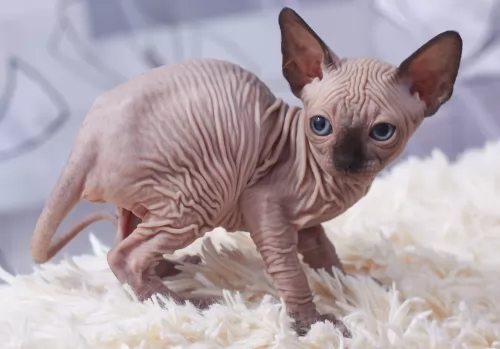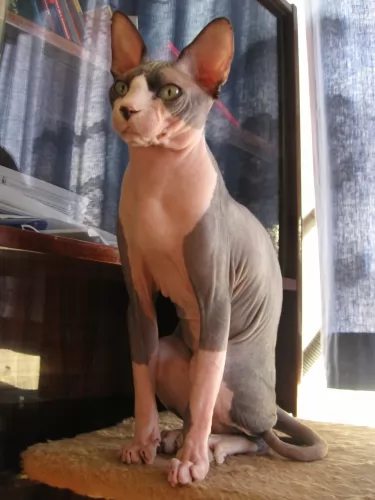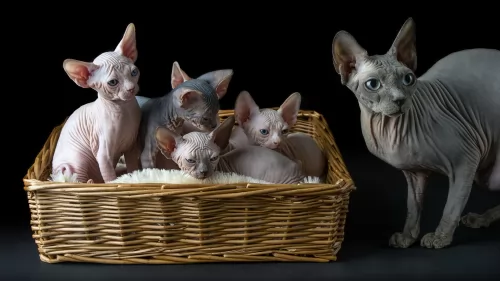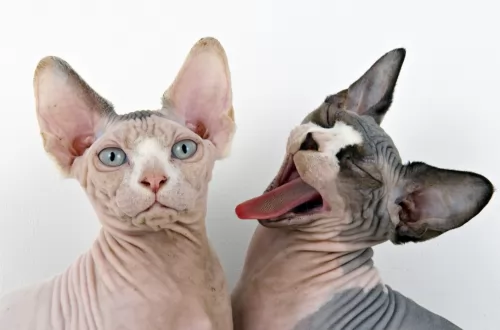 Petzlover
PetzloverSelkirk Rex is originated from United States but Sphynx is originated from Canada. Both Selkirk Rex and Sphynx are having almost same weight. Selkirk Rex may live 3 years more than Sphynx. Both Selkirk Rex and Sphynx has same litter size. Both Selkirk Rex and Sphynx requires Moderate Maintenance.
The Selkirk Rex originated in the USA in 1987. A host of cats have been used to develop this cat breed – Persians, British Shorthairs, Himalayans, American Shorthairs, Exotic Shorthairs, and others.
There was a litter of kittens and the odd one out, one with an unusual coat – was placed with the breeder, Jeri Newman, who bred the cat with a black Persian.
Three Selkirk Rex kittens were born as well as three straight-haired kittens. The cat has been developed with either long- or short coats. The Selkirk Rex cat breed is recognized by various cat associations such as the International Cat Association, the American Cat Fanciers Association in the 1990s as well as the Cat Fanciers Association in 2000.
 The Sphynx cat is well known for its hairlessness. This breed started its development in Toronto, Canada.
The Sphynx cat is well known for its hairlessness. This breed started its development in Toronto, Canada.
A hairless kitten was born and it was mated to produce more hairless kittens. These kittens were called Canadian Hairless Cats. They were used as the foundation for a new breed.
In the 1970s, more hairless kittens were born and placed into the Sphynx breeding program. They were mated with Devon Rex cats. The International Cat Association recognizes this cat breed.
The Selkirk Rex is a medium- to large-sized cat that will weigh between 3 to 6kg. He is a well-built cat of which you get a short- and long coat variety. The coat is available in all colors. The coat has a soft, woolly look to it with some curls.
With the long-haired variety, the cat has a well-plumed tail. One drawback perhaps is that the cat is a fairly heavy shedder, and perhaps wouldn’t be a good choice for those with allergies.
This is a lively, playful, energetic cat with a friendly temperament. Cat experts will tell you that it is the Persian and British Shorthair ancestors that have given him his placid, lovable nature. He is, however, more active than those cat breeds and loves to play.
Tolerant and affectionate, the Selkirk isn't a lap cat. Because he has a sociable nature, he dislikes being left alone for long periods of time.
The Selkirk Rex fits in well with households where there are well-behaved children and other pets. He is such a loving cat and loves to be in the company of his human companions. He isn’t demanding and likes to talk to you in a quiet voice.
 The Sphynx is a medium-sized, fine-boned, muscular cat that weighs roughly between 3.5 – 7 kg. The skin of the cat has a soft chamois type feel to it.
The Sphynx is a medium-sized, fine-boned, muscular cat that weighs roughly between 3.5 – 7 kg. The skin of the cat has a soft chamois type feel to it.
Sometimes there can be a few hairs. The head of this cat is longer and narrower than many of the other cat breeds. The ears are large.
This cat is going to need a bath once a week with special medicated cat shampoo. The cat also has no whiskers or eyelashes. The legs are long and slender and he has a barrel chest. All skin patterns and colors are available with the cat.
The Sphynx is a loving, friendly, energetic, extrovert cat that loves nothing more than to be petted and pampered.
It one of the few dependent cats there are. Even though he is social, he isn’t very vocal. They are playful too and because they are also intelligent, they will need stimulating games and toys to keep them from becoming bored.
They get on well with children in the home. Like many other cats, the Sphynx cat can be doglike and they like to welcome their owners home.
When you welcome a Selkirk Rex cat into your home, you’ll have a loving friend and companion.
They love to bask in the attention they get as they’re quite unusual with their wavy to curly coats. People are always wanting to touch it.
The Selkirk Rex cat is an active, playful cat and has a whole lot of love to offer you.
 The Sphynx can be in a house where there are children who have been taught to be kind and gentle with animals.
The Sphynx can be in a house where there are children who have been taught to be kind and gentle with animals.
The cat is energetic and loves to entertain and amuse his human family with his antics.
He is loving and loyal to his human family and absolutely hates staying on his own. He can actually get depressed when he is left on his own often.
He would be far better off with another cat companion. If you're looking for a fun, playul, loving and affectionate feline companion, you need look no further than the weird-looking sphynx cat.
The Selkirk Rex cat, if looked after well and given excellent food can live to be 15, 16, or 17 years of age. Some of these cats can suffer from hair loss. Remember, that every cat will require vaccinations and de-worming.
Chronic kidney failure usually develops over a number of months. Chronic kidney failure in cats is a progressive illness but if you get your cat to the vet it can be managed. The vet will want a sample of your cat's urine and possibly a blood test.
 The Canadian Sphynx, just because of its lack of hair, already faces challenges. Other cats have fur to keep them warm and to protect the skin from sunlight.
The Canadian Sphynx, just because of its lack of hair, already faces challenges. Other cats have fur to keep them warm and to protect the skin from sunlight.
In fact, when the kittens are born, without hair, they are vulnerable and become prone to respiratory infections. Reputable breeders, therefore, only allow their kittens to go to new homes when they are at least 14 weeks of age.
This cat is also prone to skin problems and this could include rashes and fungal infections. As with any other cat, the Sphynx cat requires protection from harmful cat diseases by being vaccinated.
Your Selkirk Rex will need to have his fur brushed. You don’t want to brush him too hard every week as this can cause the curls to frizz. Rather use a spray bottle with some cat conditioner and lightly spray the curls and use your fingers to ‘comb’ his hair.
Provide your cat with well-balanced meals. Your Selkirk Rex is a carnivore and you have to ensure that his food is made up of meat. The best commercially manufactured cat foods know how to correctly balance your cat’s food so that it gets the perfect blend of vitamins and minerals. Always choose a good brand of cat food that will meet your cat's nutritional needs. If you’re unsure, you can always ask your vet for suggestions about good quality food that will help towards ensuring good health for your cat.
The cheaper, unknown brands may not have the best ingredients to keep your cat happy and healthy. Remember to read the labels as a growing kitten will require different food to a senior cat.
Provide your Selkirk Rex with a litter box, scratching post, and a climbing tree.
Your kitten will need to be vaccinated to protect him from some of the life-threatening diseases cats can get. Most of the vets these days recommend a combined vaccine, starting at about 8 weeks of age. These vaccines will protect your kitten from Feline Leukaemia Virus, Feline Parovirus, and cat flu.
 Even though the Sphynx cat is hairless, he isn’t to be regarded as a low maintenance cat. First of all, the sheer lack of hair means he is more vulnerable to the sun and to the cold. If he goes outdoors, you have to be careful that his skin doesn’t get burned.
Even though the Sphynx cat is hairless, he isn’t to be regarded as a low maintenance cat. First of all, the sheer lack of hair means he is more vulnerable to the sun and to the cold. If he goes outdoors, you have to be careful that his skin doesn’t get burned.
These cats also have more ear wax than other cats as they don’t have hair in their ears. Dirt, wax, and oils can accumulate in the ears. They will need to be cleaned regularly, and a vet or the pet groomer can help you with this.
The Sphynx cat also collects oil and dirt under their nails, so just like the ears, the nails as well as the surrounding skin folds will need to be properly cleaned. Cat owners need to know that these hairless cats aren't as low maintenance as thought, but require quite a bit of grooming. Special grooming products are available for this cat.
What one cat likes to eat won’t be the same as another cat. The Sphynx, like every other cat, is a carnivore and he will need all the different nutrients from his food.
The best commercial cat food manufacturers know that the proportion of these nutrients will vary as the cat ages and goes through different stages of its life. Your cat needs the right meat foods and he needs the right quantity as well.